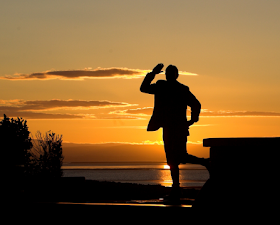Soul Music can often be a Radio 4 highlight. It can take you deep into a piece of music and into people's reactions to a piece of music. It often gets the balance right but sometimes overdoes the 'moving' element (as I think this episode did). Moving as the various reflections were they were, as a whole, rather too moving and, thus, rather too depressing - despite always ending in some strong note of consolation.
Anyhow, this week's subject was Auld Lang Syne and I'm still grateful to this programme for encouraging me to read the original Robert Burns poem and to try and understand it.
It is a poem, after all, whose Scots dialect is so strong that even it's most famous phrase "For auld lang syne" remains hard to pin down in translation - though it literally translates as 'old long since', so I've always understood it to mean 'for old times' (or 'for the sake of old times'). And translation is certainly needed nowadays for "gowans" (daisies), "dine" (dinner time), "braid" (broad), "fiere" (friend), "guid-willie" (hearty), "wraught" (big drink) and "pint-stowp" (tankard).
It is a poem, after all, whose Scots dialect is so strong that even it's most famous phrase "For auld lang syne" remains hard to pin down in translation - though it literally translates as 'old long since', so I've always understood it to mean 'for old times' (or 'for the sake of old times'). And translation is certainly needed nowadays for "gowans" (daisies), "dine" (dinner time), "braid" (broad), "fiere" (friend), "guid-willie" (hearty), "wraught" (big drink) and "pint-stowp" (tankard).
Fred Freeman, Professor of Scottish Music at the Royal Conservatoire of Scotland, was the programme's chief expert and he noted that Rabbie's claims to have collected the song from an old timer wasn't really true and the poet wrote it mostly himself. Moreover, when Burns sent it in to James Johnson of the Scots' Musical Museum he did so to a different tune to the one we all sing this very night - and a lovely tune it is too:
As for the tune we do all sing, here's Prof. Freeman:
The thing is this. The only time that Burns ever used that reel, intact, as we know it. For Auld Lang Syne, the one that's sung universally, is that Burns used it for a song about impotence: O Can Ye Labour Lea? as a lassie accuses this lad of not being able to manage quite frankly!
And the meaning of Auld Lang Syne according to Fred Freeman?:
The story of Auld Lang Syne is very much a simple one: A chap sits with his mate. probably in a pub, and he asks a rhetorical question, "Should old acquaintance be forgot?" In other words, "Is that the way of it? Do we just forget about friendship?" In the chorus he maintains that he and his jo - his sweetheart - will raise a glass to friendship. And he turns to his mate and avers, "Surely both of us will buy a drink to friendship." Then he reflects on old times when he and his mate were young. They climbed the braes - the hillsides. They pulled the daisies. They paddled in the burn - the stream. But that was before his mate settled overseas, a long time ago. His thoughts return to the present and then, in the most powerful lines, he extends his hand in friendship and says, "And we'll have that drink now!"
Now it's a simple story but Burns has two serious objectives here. One is that he wants to make a universal statement about human brotherhood. Secondly, he wants to make a more intimate statement about what the Scottish experience of brotherhood should be.
He doesn't paint the picture of a particular Scottish scene. It's a generalised landscape. So it's Scotland to a degree and it's everywhere. And that makes it a human landscape anybody can identify with.
Not everybody identifies with bagpipes (to put it mildly), but I do love a good piper. So farewell to 2016!



Wishing you all a very happy hogmanay, and with another version courtesy of 'er indoors...
ReplyDeletehttps://www.youtube.com/watch?v=c2InNWvObRc
So we are supposed to approve the central idea of this song that community is built on shared memory, stretching back over many years? Hmmm...the BBC probably missed that in translation. A Man's a Man is more their cup of tea.
ReplyDeleteRobbie Burns has always struck me as a bit of scoundrel and a hypocrite but a loveable rogue, nonetheless with a commendable level of life force for one living more or less next to the Arctic Circle. :)
He certainly liked the lassies:
DeleteO saw ye bonnie Lesley,
As she gaed o'er the Border?
She's gane, like Alexander,
To spread her conquests farther.
To see her is to love her,
And love but her for ever;
For Nature made her what she is,
And never made anither!
Thou art a queen, fair Lesley,
Thy subjects, we before thee;
Thou art divine, fair Lesley,
The hearts o' men adore thee.
The Deil he could na scaith thee,
Or aught that wad belang thee;
He'd look into thy bonnie face,
And say, "I canna wrang thee!"
The Powers aboon will tent thee,
Misfortune sha'na steer thee;
Thou'rt like themselves sae lovely,
That ill they'll ne'er let near thee.
Return again, fair Lesley,
Return to Caledonie!
That we may brag we hae a lass
There's nane again sae bonnie.